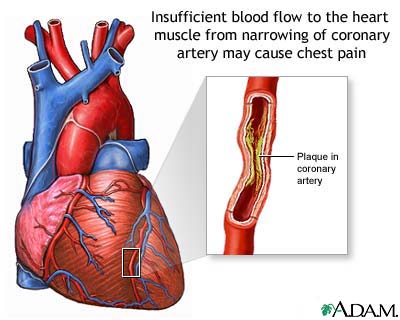Cholesterol is a substance located in the lipids (fats) of your blood. Cholesterol is required by your body to produce healthy cells, but too much of it will pose health risks and make you more vulnerable to a heart attack. High cholesterol levels can affect men and women, young and old people, although those over 40 are at greater risk.
Symptoms
Some people don’t exhibit any symptoms even when their cholesterol levels are above normal levels, and they only learn of it when they visit a doctor. However, other people report feeling dizzy and nauseous. There are also cases wherein people feel as if there is a weight on their chest and have difficulty breathing. The reason is as cholesterol levels increase fatty deposits appear in your blood vessels and make it harder for blood to flow in the arteries.
 What this means is your heart will not receive the proper amount of oxygen it requires to function, making you more susceptible to a heart attack. At the same time, the reduced blood flow increases your risk of getting a stroke. Research has shown that high cholesterol may be inherited, but more often than not it is brought about by poor diet and an unhealthy lifestyle. The lack of exercise and physical activity also makes you more vulnerable to high cholesterol. If you are obese, live an unhealthy lifestyle and inactive, your “good” cholesterol will go down and your “bad” cholesterol will go up. However, diet isn’t the only factor as genetic makeup can contribute to high cholesterol.
What this means is your heart will not receive the proper amount of oxygen it requires to function, making you more susceptible to a heart attack. At the same time, the reduced blood flow increases your risk of getting a stroke. Research has shown that high cholesterol may be inherited, but more often than not it is brought about by poor diet and an unhealthy lifestyle. The lack of exercise and physical activity also makes you more vulnerable to high cholesterol. If you are obese, live an unhealthy lifestyle and inactive, your “good” cholesterol will go down and your “bad” cholesterol will go up. However, diet isn’t the only factor as genetic makeup can contribute to high cholesterol.
When to Seek Medical Help
Consult your doctor if you experience any of the symptoms described earlier. Even if you don’t feel anything, you should undergo medical tests every six months to check your cholesterol level. If left untreated you could suffer serious chest pain or develop a blood clot.
Treatment
High cholesterol can be treated by eating a balanced diet and exercising. Far more effective is to prevent your cholesterol from getting too high in the first place. If you already have high cholesterol, you need to take medication like Lipitor (atorvastatin calcium). This tablet, when combined with a low fat diet, will raise your HDL (“good”) cholesterol and reduce your LDL (“bad”) cholesterol. With this drug you can reduce your risk of a stroke or heart attack, and this drug will also benefit patients with existing heart conditions.
Lipitor is usually taken 10 to 20 mg daily, although your doctor may prescribe a higher dose if your cholesterol level is very high. While this medication can reduce bad cholesterol by as much 30 to 60%, it is not for everyone, and those with an allergic reaction to the drug should avoid it. This drug is also not for those with liver ailments, as well pregnant women, or women who want to become pregnant. If you are going to take this drug, tell your doctor if you feel any muscle pain, as this could be a serious side effect. Other common side effects include stomach upset, joint pain and diarrhea.
Share This